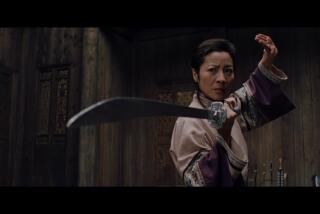Shanghai Film Fest: Tale of American boy in China wins prize
- Share via
SHANGHAI — “The Dragon Angel,” the story of an American boy who saves a traditional Beijing home from destruction by his architect father and a Hong Kong developer working together to put up a skyscraper, was voted the most promising co-production in development by producers gathered at the 15th Shanghai International Film Festival this week.
The film is from Chinese director Ning Ying and French producer Igor Darbo, with a script by Dana Ziyasheva and animated effects from China’s Pixomondo. Ning and Darbo hope that by making their film’s bad guys foreigners and telling its story through the eyes of a 12-year-old growing up in a strange land, they can raise an issue on screen that would likely be blocked by state censors if the villains were Chinese.
Ning insists “The Dragon Angel” will be a family film, not one about the demolition that so often rubs out whole Chinese neighborhoods, uprooting generations of families, traditions and memories to make way for modern glass and steel. In China, where the one-party state controls all land deeds, land sales regularly spark protests that sometimes turn violent and seldom get full and fair media coverage.
“The story is about a child discovering the magic feeling of old Beijing and having adventures with the neighborhood kids in the world they re-create around them,” she said.
Seeing “Harry Potter” films made Ning think about drawing on Chinese folklore to create a movie that would draw a big audience and teach them something about the city whose modern history stretches back to 1421.
“Beijing was the most advanced city in the world until London sprung up. It’s very valuable to study this culture and try to create a magical world with its elements using the movie language of today,” Ning said.
Plumbing the depths of the Chinese capital is nothing new for the director whose “Beijing Trilogy” chronicled the massive changes in her hometown from 1993 to 2001. To make sure she could revisit old themes without raising government eyebrows, Ning discussed the premise of “The Dragon Angel” with contacts at the State Administration of Radio Film and Television, whose approval is needed to start shooting a film one expects to distribute legally in China.
“I got a very positive answer, so we began to write,” she said. “Dana and Igor, though they speak good Chinese, still see China through European eyes. I will bring the perspective that can reflect the Chinese mentality.”
For a time in the late 1980s, Ning lived in a traditional courtyard home down one of the city’s fast-disappearing ancient alleys. By the end of the 1990s, as she finished “I Love Beijing,” the last part of her trilogy, Ning’s home and the neighborhood around it were razed to make way for Financial Street, an avenue of blocky office buildings housing state-run and multinational corporations.
“Nowadays, I can hardly say exactly where my home was,” Ning said, recalling digging a garden in her courtyard and uncovering ancient stones from previous structures. “Sometimes I want to go back to my old place to shoot it, but it would be very difficult to know where to point my camera. It’s completely unrecognizable.”
Born in 1959, Ning was no stranger to change as a child. After the upheaval of the Cultural Revolution, she was a student in the first class to reenter the Beijing Film Academy in 1978.
She parted ways with her classmates the acclaimed directors Zhang Yimou, Chen Kaige and Tian Zhuangzhuang when she won a scholarship in 1981 to study film in Italy, where she met Federico Fellini and worked with Michelangelo Antonioni before returning to China in 1987 as an assistant director to Bernardo Bertolucci on “The Last Emperor.”
“The Dragon Angel” story was originally inspired by Darbo’s chance encounter in Paris with a retired French military doctor whose ancestors helped a foreign military alliance loot and finally destroy the elaborate Summer Palace in Beijing twice in the second half of the 19th century.
“They came back with a dress that belonged to Cixi, the last empress, and at the end of his life this old man wanted to find a way to give the dress back, to close the circle,” said Darbo, who first moved to Beijing in 2004 as breakneck development in the run up to the 2008 Beijing Olympics began to transform the city yet again.
Ning and Darbo met that year on set in Yunnan, in southern China, working on her $3-million film “Kung Fu Hero,” soon to be released by the China Film Group.
“The Dragon Angel” will be shot in English for a proposed budget of $11.5 million, drawing, Darbo said, on U.S. private equity funds and Chinese co-production money he is seeking from a growing number of suitors. “The Dragon Angel” bested 23 other co-production projects at the festival to win a prize of 100,000 yuan ($15,714) development money.
[For the record, 7:47 p.m. June 21: The headline on an earlier version of this post said “The Dragon Angel” is an animated film. It is a live-action film with animated enhancements.]
RELATED:
Chinese filmmakers commiserate at Shanghai festival
Shanghai film festival: Q&A with Jean-Jacques Annaud
Hollywood filmmakers gather in China at Shanghai film festival
More to Read
Only good movies
Get the Indie Focus newsletter, Mark Olsen's weekly guide to the world of cinema.
You may occasionally receive promotional content from the Los Angeles Times.










